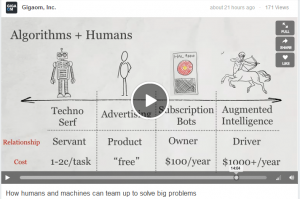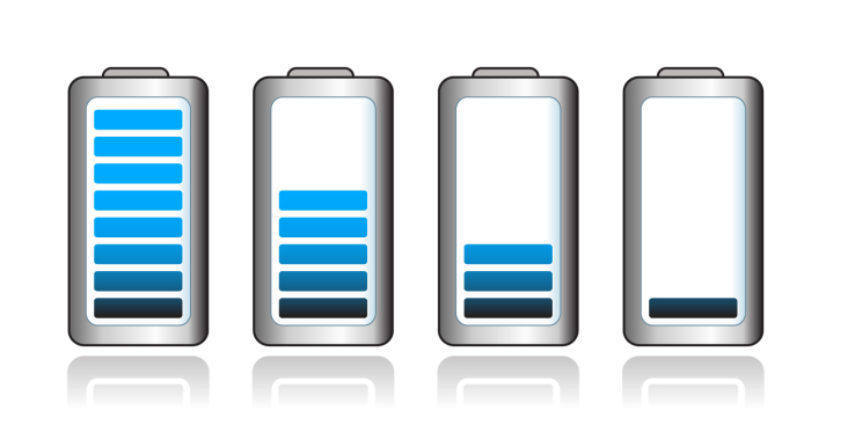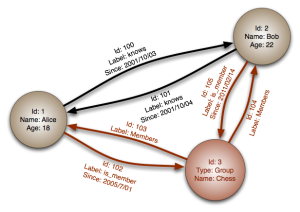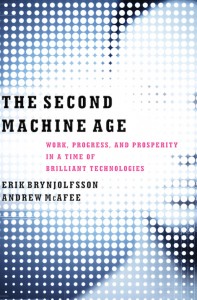Here’s an excerpt from the piece. “People love their smartphones but hate poor battery life. We love having access to the world’s information at our fingertips but tire of the need to constantly plug into the world’s electricity grid. The recharging model of batteries fails us — the marketplace is ready for a new approach to portable power. ” Read More
Startups
Embracing the Connected Data Vision of LinkedIn’s Economic Graph
Possibility: By 2025, LinkedIn’s Economic Graph will be its most important commercial product and widely seen by policy-makers and pundits as the most insightful economic, education and social policy tool in the world as it helps us confront challenges of unemployment, skills gaps and creating a positive culture of an engaged workforce. Read more
Why I just backed a Kickstarter FuelCell Project for Personal Power
 5 minute Summary: I just backed a micro fuel cell project on Kickstarter that is on track to raise $1 million! Why? There is a very seductive vision based on a new distribution model for portable fuels and micro power plants. This post highlights a vision for 2030 when any person in the world can buy clean hydrogen-rich molecule fuels and mini power plants (micro fuel cells) on any local retail shelf. Read more
5 minute Summary: I just backed a micro fuel cell project on Kickstarter that is on track to raise $1 million! Why? There is a very seductive vision based on a new distribution model for portable fuels and micro power plants. This post highlights a vision for 2030 when any person in the world can buy clean hydrogen-rich molecule fuels and mini power plants (micro fuel cells) on any local retail shelf. Read more
Working with Intelligent Assistants
Soon after 2020, service and knowledge workers might begin to see their own personal Intelligent Assistant as the key to their workplace success.
The age of the Intelligent Assistant is close but will take years and decades to unfold. Rather then envision Hal from 2001:A Space Odesssy or dream of Scarlett Johannsen’s voice “Samantha’ from the movie Her — focus on understanding the implications of systems like IBM Watson or Kensho’s Warren at work.
Learning Startup to Watch: Declara’s Vision of a Cognitive Graph
Declara is one of the most unique startups in the world of enterprise-scale learning platforms. The company has built an intelligent social learning system that is often referred to in the media as a combination of Google’s Knowledge Graph and Facebook’s Social Graph.
Declara’s vision is to create and leverage a Cognitive Graph that delivers neuroscience-inspired personalized learning based on the context of real-world experiences, intent, outcomes and social relationships.
The system aims to deliver content recommendations and facilitate the most appropriate social connections between learners across large organizations and social communities. The platform integrates the latest capabilities of artificial intelligence subdomains – machine-learning and deep-learning to scale-up predictive analytics and prescriptive learning experiences based on an individual’s intentions, capabilities and needs.
The company sees a very rich and untapped landscape of learning analytics that will benefit from neuroscience-based insights on learning experiences. The ‘adaptive’ and ‘intelligent’ labels simply mean that Declara’s infrastructure learns over time based on real-world interactions and outcomes.
Declara’s CEO Ramona Pierson (Twitter) has an amazing comeback life story and a brilliant mind that sees the convergence of neuro-cognitive science, intelligent social systems, semantic search, graph databases, et al. Co-Founder Nelson Gonzalez (LinkedIn; Twitter) brings a pragmatic and optimistic lens to learning analytics and the intersection of local cultural elements and semantic search.
Declara has a very clear scale-out oriented business model that targets large customers such as national government associations (e.g. Mexico’s SNTE, Australia’s CSE) and enterprises like Genetech. They picked a wonderful problem to solve. Declara is a startup to watch…!!
Learn More:
- Declara on Twitter
- Bloomberg article
- Business Week Interview Ramona Pierson Novemmber 2013
- Semantic Web blog post
Interesting links on cognitive graph:
- IBM is hiring an intern for Social Analytics and Cognitive Graph (umm!!);
- Nodus Labs Graph
- Garry’s tags on Machine-Learning; Deep-Learning; Graph; Adaptive; Watson
Videos
Ramona Pierson
Interview at 2014 Gigaom event
Ramona Pierson speaking
Nelson Gonzalez – 2010 brief interview – hopefully more Youtube clips will appear soon!
https://www.youtube.com/watch?v=xmjDVrz5X5g
From Apple’s Knowledge Navigator to Mindmeld: The Evolution of Personal Assistant
Expect Lab‘s Marsal Gavalda walks us through 26 minute video of techno-optimistic geek goodness by looking at present day enthusasiam for personal assistant technologies and some of the historical milestones that brought us here.
Why the enthusiasm in 2014? The Spike Jonze’s movie Her gets credit for popularizing the idea of a likeable and lovable personal assistant but the real source of optimism is just old fashion innovation from our learning curve. Artificial intelligence sub-domains of machine-learning and deep-learning (used for real-time understanding of natural language) are making steady progress. The past few years have given the world very positive advances around knowledge graphs for natural language, sentiment analysis of unstructured data, and anticipation oriented recommendation systems.
The next five years will bring hype and real hope for functional contextual search and conversation-based experiences that make personal assistant beyond 2020 likely and doable. I have waxed poetic about Expected Labs MindmeldAPI and have the same respect for companies like NextIt and Artificial Solutions (Indigo) who are creating the early market demand.
My highlights from his talk: min 2:20 Github workflow and productivity visualization]
https://www.youtube.com/watch?v=fKen7IkdAm0
** **
Marsal mentioned the Apple 1987 video of the Knowledge Navigator
https://www.youtube.com/watch?v=QRH8eimU_20
** **
Garry’s Tags: Personal Assistant;
Cognition-as-a-Service: Rent Learning Machines Inside the Cloud
 Summary: Siri and IBM Watson for everyone? Organizations might soon be able to rent brain power by the hour from the cloud – creating a new marketplace for contextually-aware and adaptive applications powered by software programs that learn from real-world human user interactions. Our educational and workflow experiences might soon access cogntive computing applications to learn more effectively and make better decisions on complex issues.
Summary: Siri and IBM Watson for everyone? Organizations might soon be able to rent brain power by the hour from the cloud – creating a new marketplace for contextually-aware and adaptive applications powered by software programs that learn from real-world human user interactions. Our educational and workflow experiences might soon access cogntive computing applications to learn more effectively and make better decisions on complex issues.
Companies are starting to experiment with business models to deliver cloud based cognition in the form of ‘contextual and cognitive computing’ via API Engines and stand alone software solutions.
Contextual & Cognitive Computing
Cognition as a Service is just a buzzword today. It is far from defined! The most likely path towards bringing cognition level abilities to organizations will likely pass through stages. The first will be an evolution towards contextual experiences followed by more sophisticated ‘IBM Watson’-like applications.
Contextual web experiences move us from information being delivered by ‘keyword’ connections to a more personalized sense of the right ‘context’ for our lives based on: location, activity, life experiences and preferences, et al. Contextual experiences are more personalized and certainly ‘learn’ from interactions with users – but there is a new paradigm of ‘cognitive’ systems that elevate the experience.
Cognitive Computing is an era where software systems learn on their own and can teach themselves how to improve their performance. IBM Watson is today’s most sophisticated cognitive application. Watson is currently providing decision support for cancer treatments at Sloan Kettering, financial service support for companies such as ANZ and CitiGroup, and working to evolve the retail customer experience for Northface.
Cognition as a Service?
In practical terms this means an organization might be able to buy ‘as a service’ (e.g. not an application they paid to develop or maintain) – natural language processing for human-like Question & Answer interactions.
Companies pushing both of these capabilities are simultaneously trying to improve performance, integration and business model design. Early industry adopters will range from health, finance, energy, education, et al. Industries with connected data and a need for augmenting human knowledge building. Early adopters industries will likely have lots of data and compliance heavy regulatory frameworks.
The cloud-based business models of ‘software-as-service’ and ‘platform/infrastructure-as-service’ are the most likely first path for contextual and cognitive platforms. Startups such as Expected Labs are bringing their API engine MindmeldAPI into the marketplace. IBM Watson is hedging its bets by delivering stand alone solutions and also opening up its API to developers.
Developers are just now getting their hands dirty with advanced contextual computing applications. Truly transformational applications will likely emerge 2015-2025.
Companies to Watch:
AlchemyAPI, Declara, Intelligent Artificats, Grok, Saffron, Stremor PlexiNLP and Vicarious are companies with products designed to build knowledge graphs and natural language interactions that have contextual and cognitive computing style capabilities.
Video to Watch – Range of Business Models?
Sean Gourley – Founder of Quid has been wrapping his head around the future of mankind working ‘with’ machines for several years. I’ve seen Sean’s talk evolve over two years– and it continues to be among the most solid framings of this massive transition towards ‘augmented intelligence.
This is a great talk by Sean Gourley from the March 2014 GigaOm Data Structure Conference.
***
I’ve posted Expected Labs Mindmeld videos here
***
Looking for something more mainstream and business oriented:
Garry’s Diigo Tags on: IBM Watson;
Startup to Watch: Expected Labs & Mindmeld Intelligent Assistant
Some of the world’s most visionary and innovative software teams are working to develop intelligent assistant applications that stand at the crossroads of knowledge graphs, natural language processing and context aware user experience design.
Consumer grade intelligent assistant products include Apple Siri and Google Now. The business world is watching IBM Watson – a Deep Q&A service based on Big Blue‘s cognitive computing era vision for business applications in healthcare, finance and customer service.
These large software technology companies are not alone. There are dozens of intelligent assistant startups helping to drive the field forward. Which startups are worth following?
Startups to Watch: Expected Lab (Mindmeld)
Expected Labs first received attention in 2012 when its Mindmeld application won over hearts and minds as Finalists at TechCrunch Disrupt. In 2013 the company secured more funding to bring Mindmeld to market.
http://www.youtube.com/watch?v=5NGGSBt0hkw
Expected Labs is a young company working on an old problem. The idea of computer as an intelligent personal assistant is as old as the history of computing machines. The most contemporary lineage dates back to the U.S. DARPA sponsored the CALO program (Video of Cognitive Assistant that Learns & Organizes). CALO’s platform was spun-off into technology development firm SRI – which in turn sold a platform to Apple for its Siri applications.
The intelligent assistant product landscape has seen significant advances in recent years thanks to advances in machine-learning, deep-learning, data graphs, semantic collection volumes — and more transparent and predictable human users. The next five years will be an exciting time for the community ;-).
Expected Labs is a team to watch in 2014 and beyond.
Videos below on Mindmeld and the future of intelligent assistants
Product Promotion
http://www.youtube.com/watch?v=5NGGSBt0hkw
Updated: Detailed Product Overview
http://www.youtube.com/watch?v=XKGcvRkagmY
Expected Labs CEO Tim Tuttle (Twitter) has created a series of short videos looking at the Future of Intelligent Assistants around key areas of performance improvement: Speed, Accuracy, Intelligence, and Anticipation. Tuttle is a big thinker with a sharp mind and sense of where knowledge graphs and anticipatory user experiences could evolve!
Let Tim Tuttle explain why we should be bullish on the age of intelligent assistants…
Speed
http://www.youtube.com/watch?v=L-PoDin69-g
Understanding the User
http://www.youtube.com/watch?v=vN266-vlmiQ
** I think ExperienceAPI and Learning Record Stores (LRS) could be integrated here!
Accuracy
http://www.youtube.com/watch?v=irRKPlUDGNA
Role of Knowledge Graphs
http://www.youtube.com/watch?v=HciVAMkmeS0
Contextual Computing – Focus
http://www.youtube.com/watch?v=c2q31dMHX4E
Learn More?
Casual or skeptical observers might want to consider the future of Intelligent Assistants and how society might approach the idea of anticipatory computing experiences and the notion of the device listening to you! These platforms will bring new risks, rewards and responsibilities to our digital culture.
More curious technical minds will want to learn about machine-learning, deep-learning, graph databases (Neo4j), semantic graphs (e.g. ConceptNet), TinCan-ExperienceAPI, Learning Record Stores (LRS), et al.
New Blog for 2014
I have let go of a few years of blogs posts from garrygolden.net from 2008-2013!
Time to start fresh. Old URLs may still be live but not linked here!



